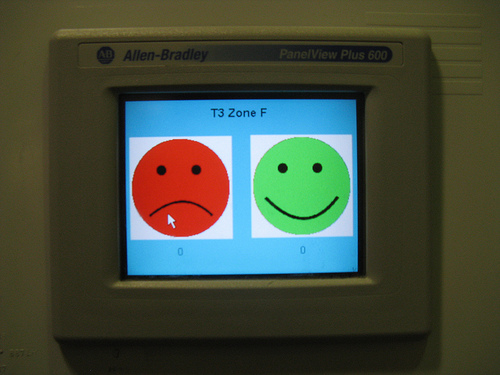Politics and the geography of happiness
How important is where you live to how happy you are? And how much does how happy you are influence your politics? The Atlantic put out a fascinating map today based on the geographical origins and the sentiment of over 10 million tweets. Put more simply, they figured out which cities and states were the happiest based on 10 million tweets from around the country. Here's that map:

In this map, red means happy and blue means sad.
According to their data, more affluent and more liberal people are both happier than those who are conservative and poor. This isn't surprising. One immediate question, though, is whether there are just more affluent and liberal people using Twitter in the first place, creating some bias both by the skew in usage toward them and with the fact that you have to WANT to use Twitter in the first place- why put in the time to use a service just to publicly talk about how miserable or upset you are?
Those things aside, though, when I saw this map the first thing I thought was: "That looks like the electoral college votes from the last election." It turned out I was pretty right.
If you look at the electoral college results from the 2012 election and compare them to the results of this map of national happiness, it's a notably comparable pattern. Only this time, the colors are switched. Happy areas that were in red above match up with liberal areas that are in blue and vice versa.

Obviously this is not scientific, but it appears that states that voted Republican are also more sad, whereas those that voted Democrat are happier. Is this because areas where people are open-minded and embrace cultural and other kinds of diversity mean more people can and will be happy? Or does it mean that the same geographic troubles in an area like the southeast or the midwest will lead people to sadness, religious beliefs and votes to keep taxes low?
These questions, of course, I cannot answer. But the basic correlation is intriguing. Thoughts on why it is like that or what it means?
Photo courtesy of Kevan via flickr
